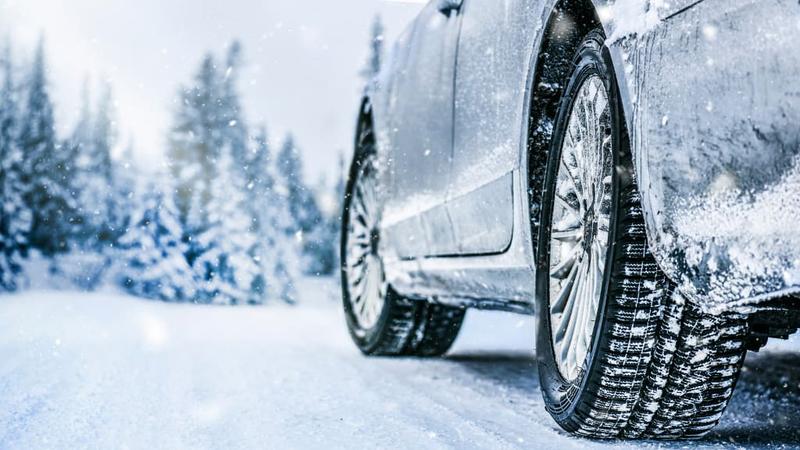Winter road trips top Canadians' vacation plans this season; are their cars ready?
Wednesday, 17 November 2021 04:23.PM
- Michelin driving expert Carl Nadeau shares his latest tips to prep for driving in the cold, in snow and on ice this winter. -
With winter predicted to arrive sooner than usual in many parts of the country, driving conditions will quickly start to challenge drivers across the country. A recent Michelin poll reveals that 40 per cent of Canadians are looking forward to winter road trips and 29 per cent of them want to see friends and relatives who live further away, but many may not be as prepared to tackle the road as they think.
Professional race car driver and Michelin driving expert Carl Nadeau shares his tips to make sure both you and your car are ready to tackle rough driving conditions our Canadian winters bring year after year.
Installing Winter Tires
As of mid-November 2020, only 43 per cent of Canadians had installed their winter tires, which is past the first freeze and snowfall for several regions. Add to that the fact that winter is predicted to arrive sooner this year in Canada and postponing or even skipping installing winter tires could leave you and your car unprepared. You shouldn't wait until it hits -20°C before installing them though, you should have them on your vehicle when temperatures consistently approach the freezing point.
Choosing winter tires over all-seasons is also a great idea. According to Michelin's poll, 66 per cent of Canadians reported all tires with the mountain snowflake symbol are winter tires, when that is not necessarily the case. While the 3 Peak Mountain Snowflake symbol (3PMSF) means that tires are snow-rated, this symbol only guarantees some performance minimums in winter conditions. "Winter tires are made from specific rubber compound that allows them to remain flexible in cold Canadian weather, providing better grip, traction, and braking qualities at lower temperature," says Nadeau. "When in doubt, it's always best to seek guidance from a professional."
The poll also reveals that 92 per cent of Canadians believe winter tires perform equally well year over year, when that's not actually the case. Some tires wear faster than others and performance generally decreases as they wear. Michelin designs and tests against the competition in both new and worn condition, which helps in developing innovative compounds and tread design that will continue to provide performance as the tire wears.
Vehicle Maintenance
Before you start that winter road trip, Nadeau recommends you follow these simple, yet essential, safety checks on your vehicle:
- Schedule/perform a check up: Make sure your alignment, battery, brakes, lights and belts and hoses are in top condition.
- Check your air pressure: Do it regularly – at least once a month - as tires lose pressure as the temperature drops.
- Inspect your windshield: A small crack on the windshield may, in the extreme cold, become a large crack and require immediate repair. Be proactive and repair it before winter sets in.
- Check your fluids: Make sure you always have at least half a tank of gas to avoid a frozen fuel line. Also, carry extra windshield washer fluid to ensure proper visibility.
- Wiper blades: Use blades made for winter conditions. They are heavier and push snow and ice more easily.
Emergency Kit
In case of emergencies, you may get stuck or need to spend time in your car waiting for help. Nadeau also recommends all Canadians carry the following items, at a bare minimum, in their trunk when driving around this winter:
- Emergency kit (including first-aid kid, flashlight, warm clothes, and blanket)
- A tire gauge, jack, and fully inflated spare
- Jumper cables
- Shovel, gravel, salt, or a small piece of carpet to aid with traction
- Non-perishable food and water
- Extra windshield washer fluid
With 61 per cent of Canadians reporting they don't trust other drivers, and another 37 per cent who get nervous when driving on ice and snow, making sure your vehicle is in top shape is an easy way to help keep everyone, including your family, safe on the roads.
"The cold, ice and snow paired with the nervousness of winter driving, makes it less enjoyable to get outside and enjoy road trips or visit friends and family," says Nadeau. "Preparing your vehicle as soon as the temperature begins to drop with the right winter tires and a safety kit will help give you the confidence to be on the road, no matter the weather conditions."
Michelin offers a wide variety of winter tires to suit many types of vehicles and winter conditions. The MICHELIN X-Ice® SNOW tire is a versatile tire that provides ultimate confidence and lasts up to one additional winter than the average of leading competitors.1 If you drive in very icy conditions, the studded MICHELIN X-Ice® NORTH 4 tire offers you the safety you need to remain in control. For luxury vehicles, the MICHELIN Pilot® Alpin® 5 tire can answer the needs of premium car manufacturers and drivers.
SOURCE: Michelin North America (Canada) Inc.
- Related materials:
